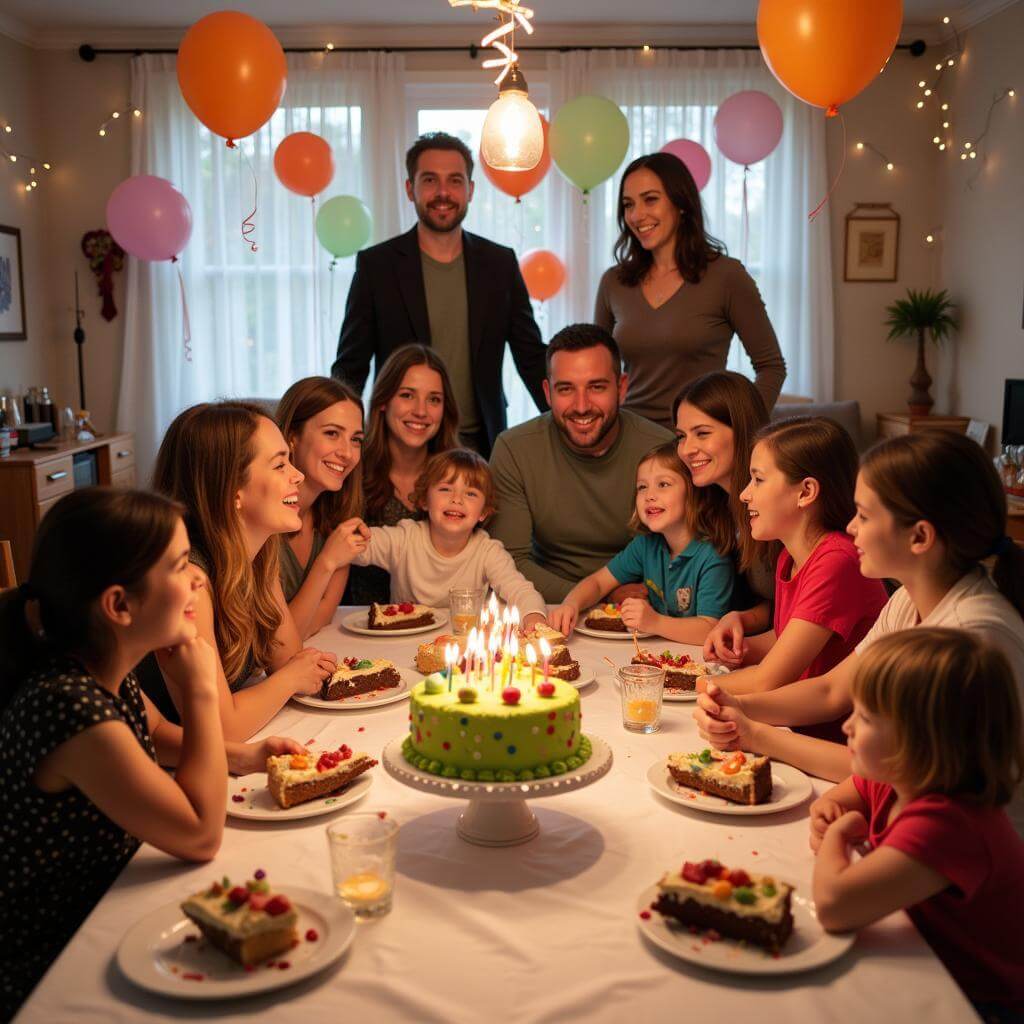Family celebrations are a common topic in IELTS Speaking tests, particularly when discussing personal experiences and cultural traditions. The question “Describe a family celebration you enjoyed recently” has appeared in past exams and is likely to be featured in future tests due to its relevance to candidates’ lives and cultural backgrounds.
Nội dung bài viết
Part 1: Introduction and Interview
In this section, the examiner may ask you some general questions about family celebrations. Here are a few examples:
- Do you often have family celebrations?
- What kind of family celebrations do you have in your country?
- How important are family celebrations in your culture?
Let’s look at a sample answer for the first question:
Examiner: Do you often have family celebrations?
Band 6-7 Answer:
Yes, we do have family celebrations quite often. We usually get together for birthdays, holidays, and special occasions like weddings or graduations. It’s a nice way to spend time with relatives and enjoy good food and company.
Band 8-9 Answer:
Absolutely, family celebrations are a significant part of our lives. We make it a point to come together for various occasions throughout the year, ranging from traditional holidays and birthdays to more personal milestones like promotions or academic achievements. These gatherings serve as a wonderful opportunity to strengthen family bonds, create lasting memories, and uphold our cultural traditions.
Part 2: Long Turn
Now, let’s look at a sample cue card for the main topic:
Cue Card
Describe a family celebration you enjoyed recently
You should say:
- What the celebration was for
- Where it took place
- Who was there
- And explain why you enjoyed it
 Family celebrating a birthday party
Family celebrating a birthday party
Band 6-7 Answer:
I’d like to talk about a recent family celebration I enjoyed. It was my grandmother’s 70th birthday party, which took place at my parents’ house last month. Many family members were there, including my aunts, uncles, and cousins. We had a big dinner with lots of traditional dishes, and we sang “Happy Birthday” to my grandmother. I enjoyed it because it was nice to see everyone together and celebrate such an important milestone in my grandmother’s life.
Band 8-9 Answer:
I’d be delighted to share my experience of a recent family celebration that I thoroughly enjoyed. The occasion was my grandmother’s milestone 70th birthday, which we commemorated with great enthusiasm last month. The venue for this special gathering was my parents’ spacious home, which provided the perfect setting for our extended family to come together.
The celebration drew a diverse crowd of relatives, including my aunts and uncles from both sides of the family, as well as a myriad of cousins spanning various age groups. It was heartwarming to see such a comprehensive family reunion, with some relatives traveling from afar to be part of this momentous occasion.
The highlight of the evening was undoubtedly the lavish feast we prepared, featuring an array of traditional dishes that held special significance for my grandmother. The culinary spread was a testament to our family’s rich cultural heritage and served as a delightful trip down memory lane for the older generation.
What made this celebration particularly enjoyable for me was the opportunity to witness the joy and gratitude on my grandmother’s face as we all sang “Happy Birthday” and presented her with a beautiful cake adorned with 70 candles. The genuine warmth and affection that permeated the atmosphere was palpable, creating an unforgettable experience that I’ll cherish for years to come.
Moreover, this gathering provided a rare chance for intergenerational bonding, as younger family members eagerly listened to captivating stories from our elders, bridging the gap between past and present. The laughter, shared memories, and sense of unity that filled the room truly epitomized the essence of family celebration, making it an incredibly fulfilling and enjoyable experience.
Follow-up Questions
- How often do you have family gatherings like this?
- Do you think family celebrations are becoming less important in modern society?
Band 6-7 Answer (Question 1):
We try to have big family gatherings like this a few times a year, usually for major holidays or special birthdays. It’s not always easy to get everyone together because of busy schedules, but we make an effort when we can.
Band 8-9 Answer (Question 1):
We make a concerted effort to organize large-scale family gatherings like this on a regular basis, typically aiming for three to four times a year. These occasions often coincide with significant holidays, milestone birthdays, or other noteworthy family events. While coordinating such gatherings can be challenging due to the diverse schedules and geographical distances involved, we prioritize these reunions as they play a crucial role in maintaining strong family bonds and creating shared experiences that enrich our collective family narrative.
Part 3: Two-way Discussion
Examiner: How have family celebrations changed in your country over the years?
Band 6-7 Answer:
Family celebrations in my country have changed quite a bit over the years. In the past, they were usually big events with lots of people and traditional customs. Now, celebrations are often smaller and more modern. People are busier, so it’s harder to get everyone together. Also, younger generations might not follow all the old traditions, but they still try to keep some important ones.
Band 8-9 Answer:
The evolution of family celebrations in my country has been quite significant over the past few decades. Traditionally, these gatherings were characterized by large-scale events that brought together extended family networks, often spanning several generations. These celebrations were deeply rooted in cultural customs and rituals that had been passed down through the ages.
However, in recent years, we’ve witnessed a notable shift in how these celebrations are conducted. The pace of modern life and increasing urbanization have led to more compact and intimate gatherings. This change is partly due to the challenges of coordinating large groups in today’s fast-paced society, as well as the geographical dispersion of family members due to work or education.
Moreover, there’s been a gradual blending of traditional and contemporary elements in these celebrations. While younger generations may not adhere as strictly to all ancestral customs, there’s often a conscious effort to retain the core essence of these traditions while adapting them to modern sensibilities. For instance, we might see a fusion of traditional rituals with more personalized or innovative celebration styles.
Another significant change has been the impact of technology on family celebrations. Social media and video calls now allow for virtual participation of family members who can’t be physically present, expanding the reach of these gatherings beyond geographical boundaries.
Despite these changes, the fundamental importance of family celebrations remains undiminished. They continue to serve as vital occasions for strengthening family ties, transmitting cultural values, and creating shared memories, albeit in evolving forms that reflect the changing dynamics of our society.
Key Vocabulary and Phrases for High Scores
-
Commemorate /kəˈmɛməreɪt/ (verb): To recall and show respect for an event or person
Example: We gathered to commemorate our grandparents’ 50th wedding anniversary. -
Milestone /ˈmaɪlstoʊn/ (noun): An important event in life or history
Example: Graduating from university was a significant milestone in her life. -
Myriad /ˈmɪriəd/ (noun/adjective): A very large number of something
Example: The celebration featured a myriad of traditional dishes from our culture. -
Palpable /ˈpælpəbl/ (adjective): Able to be touched or felt
Example: The excitement in the room was palpable as we waited for the guest of honor to arrive. -
Intergenerational /ˌɪntərˌdʒɛnəˈreɪʃənl/ (adjective): Relating to or affecting several generations
Example: Family gatherings provide valuable opportunities for intergenerational bonding.
Examiner’s Advice
To achieve a high score in the IELTS Speaking test when describing a family celebration:
-
Use a range of vocabulary: Incorporate advanced words and phrases related to celebrations, emotions, and family relationships.
-
Provide detailed descriptions: Don’t just list events; paint a vivid picture with your words.
-
Show cultural awareness: Discuss how the celebration reflects your cultural background or traditions.
-
Use varied sentence structures: Mix simple and complex sentences to demonstrate language proficiency.
-
Practice fluency: Aim for smooth delivery without long pauses or hesitations.
-
Express personal opinions: Share your thoughts and feelings about the celebration to add depth to your response.
Remember, regular practice with a variety of topics will help you describe a recent outdoor picnic you had or any other personal experience with confidence and fluency. Additionally, being familiar with your cultural traditions, such as being able to describe a traditional dish in your culture that you want to learn to cook, can provide valuable content for your responses. Expanding your knowledge on various cultural aspects, like being able to describe a traditional meal in your country, will enhance your ability to discuss diverse topics in the IELTS Speaking test.


